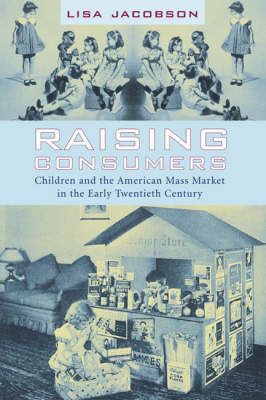
Raising Consumers
Children and the American Mass Market in the Early Twentieth Century
Seiten
2005
Columbia University Press (Verlag)
978-0-231-11389-2 (ISBN)
Columbia University Press (Verlag)
978-0-231-11389-2 (ISBN)
- Titel z.Zt. nicht lieferbar
- Versandkostenfrei innerhalb Deutschlands
- Auch auf Rechnung
- Verfügbarkeit in der Filiale vor Ort prüfen
- Artikel merken
This provocative book examines the social, economic, and cultural forces that produced and ultimately legitimized a distinctive children's consumer culture in the early twentieth century.
In the present electronic torrent of MTV and teen flicks, Nintendo and Air Jordan advertisements, consumer culture is an unmistakably important-and controversial-dimension of modern childhood. Historians and social commentators have typically assumed that the child consumer became significant during the postwar television age. But the child consumer was already an important phenomenon in the early twentieth century. The family, traditionally the primary institution of child socialization, began to face an array of new competitors who sought to put their own imprint on children's acculturation to consumer capitalism. Advertisers, children's magazine publishers, public schools, child experts, and children's peer groups alternately collaborated with, and competed against, the family in their quest to define children's identities. At stake in these conflicts and collaborations was no less than the direction of American consumer society-would children's consumer training rein in hedonistic excesses or contribute to the spread of hollow, commercial values?
Not simply a new player in the economy, the child consumer became a lightning rod for broader concerns about the sanctity of the family and the authority of the market in modern capitalist culture. Lisa Jacobson reveals how changing conceptions of masculinity and femininity shaped the ways Americans understood the virtues and vices of boy and girl consumers-and why boys in particular emerged as the heroes of the new consumer age. She also analyzes how children's own behavior, peer culture, and emotional investment in goods influenced the dynamics of the new consumer culture. Raising Consumers is a provocative examination of the social, economic, and cultural forces that produced and ultimately legitimized a distinctive children's consumer culture in the early twentieth century.
In the present electronic torrent of MTV and teen flicks, Nintendo and Air Jordan advertisements, consumer culture is an unmistakably important-and controversial-dimension of modern childhood. Historians and social commentators have typically assumed that the child consumer became significant during the postwar television age. But the child consumer was already an important phenomenon in the early twentieth century. The family, traditionally the primary institution of child socialization, began to face an array of new competitors who sought to put their own imprint on children's acculturation to consumer capitalism. Advertisers, children's magazine publishers, public schools, child experts, and children's peer groups alternately collaborated with, and competed against, the family in their quest to define children's identities. At stake in these conflicts and collaborations was no less than the direction of American consumer society-would children's consumer training rein in hedonistic excesses or contribute to the spread of hollow, commercial values?
Not simply a new player in the economy, the child consumer became a lightning rod for broader concerns about the sanctity of the family and the authority of the market in modern capitalist culture. Lisa Jacobson reveals how changing conceptions of masculinity and femininity shaped the ways Americans understood the virtues and vices of boy and girl consumers-and why boys in particular emerged as the heroes of the new consumer age. She also analyzes how children's own behavior, peer culture, and emotional investment in goods influenced the dynamics of the new consumer culture. Raising Consumers is a provocative examination of the social, economic, and cultural forces that produced and ultimately legitimized a distinctive children's consumer culture in the early twentieth century.
Lisa Jacobson is an associate professor in the history department at the University of California, Santa Barbara.
Acknowledgments Introduction "Big Sales from Little Folks":The Development of Juvenile Advertising From Thrift Education to Consumer Training: Reforming the Child Spender Heroes of the New Consumer Age: Imagining Boy Consumers Athletic Girls and Beauty Queens: Imagining the Peer-Conscious Adolescent Consumers Revitalizing the American Home: Playrooms, Parenting, and the Middle-Class Child Consumer Radio Clubs and the Consolidation of Children's Consumer Culture During the Great Depression Epilogue Notes Index
| Erscheint lt. Verlag | 14.10.2005 |
|---|---|
| Reihe/Serie | Popular Cultures, Everyday Lives |
| Zusatzinfo | 47 photos |
| Verlagsort | New York |
| Sprache | englisch |
| Themenwelt | Geschichte ► Teilgebiete der Geschichte ► Wirtschaftsgeschichte |
| Sozialwissenschaften ► Soziologie | |
| ISBN-10 | 0-231-11389-7 / 0231113897 |
| ISBN-13 | 978-0-231-11389-2 / 9780231113892 |
| Zustand | Neuware |
| Informationen gemäß Produktsicherheitsverordnung (GPSR) | |
| Haben Sie eine Frage zum Produkt? |
Mehr entdecken
aus dem Bereich
aus dem Bereich
wie die USA und China um die technologische Vorherrschaft auf der …
Buch | Hardcover (2023)
Rowohlt (Verlag)
30,00 €


